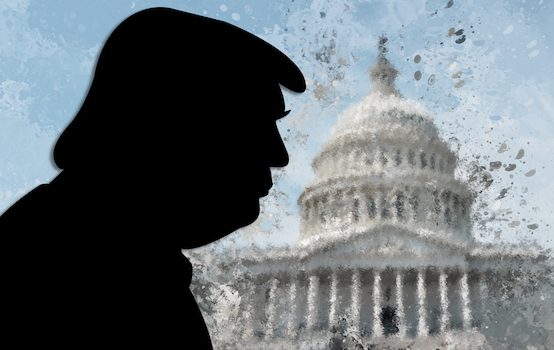The Constitutional Travesty of Our War in Yemen

“This resolution is an unnecessary, dangerous attempt to weaken my constitutional authorities, endangering the lives of American citizens and brave service members, both today and in the future.” So announced the 45th president of the United States as he vetoed a joint congressional resolution terminating U.S. participation in an ongoing war that Congress never authorized in the first place.
In the catalog of recent military misadventures in which the United States has chosen to involve itself, the war in question—a bitter civil conflict in Yemen—qualifies as small beer. At least it does if you don’t know any of the several thousand civilians who have been killed or injured, mostly as a result of air strikes conducted by the Saudi air force, with direct American support.
American warplanes are not dropping the bombs responsible for all this carnage. The United States does, however, provide the necessary ordnance, targeting data, and aerial refueling support. So we don’t do the actual killing; we just facilitate the efforts of those who do. There’s no blood on our hands—just on the soles of our shoes.
The interests cited to justify our participation in this obscure and distant struggle are difficult to discern. By classifying the conflict as a proxy war between Saudi Arabia and Iran, you might be able to talk yourself into believing that U.S. involvement in Yemen forms part of a larger strategy to avert Iranian regional hegemony. But that argument rests on two problematic assumptions. First, that the United States has a dog in this fight; and second, that of the mutts involved, Saudi Arabia is the one deserving our support. Neither assumption can withstand scrutiny.
More to the point, no less an authority than President Donald Trump himself has admitted that the U.S. is standing with Saudi Arabia in Yemen because bountiful Saudi purchases of American-made weapons keep the military-industrial complex afloat. U.S. involvement in Yemen is not a realization of strategy. It’s about customer relations—keeping Saudi Arabia happy lest it take its business elsewhere. “I don’t like the concept of stopping an investment of $110 billion into the United States,” Trump told reporters late last year. “You know what they are going to do? They’re going to take that money and spend it in Russia or China or someplace else.”
So spare me, please, presidential claims that congressional action to end U.S. involvement in this war will endanger “the lives of American citizens and brave service members, both today and in the future.” That is pure tripe.
On the other hand, Trump’s reference to “my constitutional authorities” does merit our attention, although “extra-constitutional authorities” would be more accurate. What’s really at stake here is this president’s determination to preserve prerogatives that Congress has foolishly and irresponsibly forfeited to previous presidents of both parties.
The Constitution designates the president as commander-in-chief. He presides over our wars. The Constitution also confers on Congress the responsibility to declare war. So it’s up to the legislative branch, acting on behalf of the people, to decide what is worth fighting for. Congress has made no such determination regarding Yemen.
As did several of his predecessors—Barack Obama’s ill-considered intervention in Libya offers one example—Trump has usurped war powers that rightly belong to the legislature. And by failing to override Trump’s veto of its joint resolution on Yemen, this Congress is letting him get away with it.
We have heard Trump say repeatedly that he wants to end our several ongoing long wars. His actions in the case of Yemen belie that claim.
We hear from members of Congress incessant declarations of their fealty to the Constitution. Sadly, when it comes to reclaiming war powers that are plainly theirs, too few care enough to begin repairing the damage.
Andrew J. Bacevich is The American Conservative’s writer-at-large.
Comments